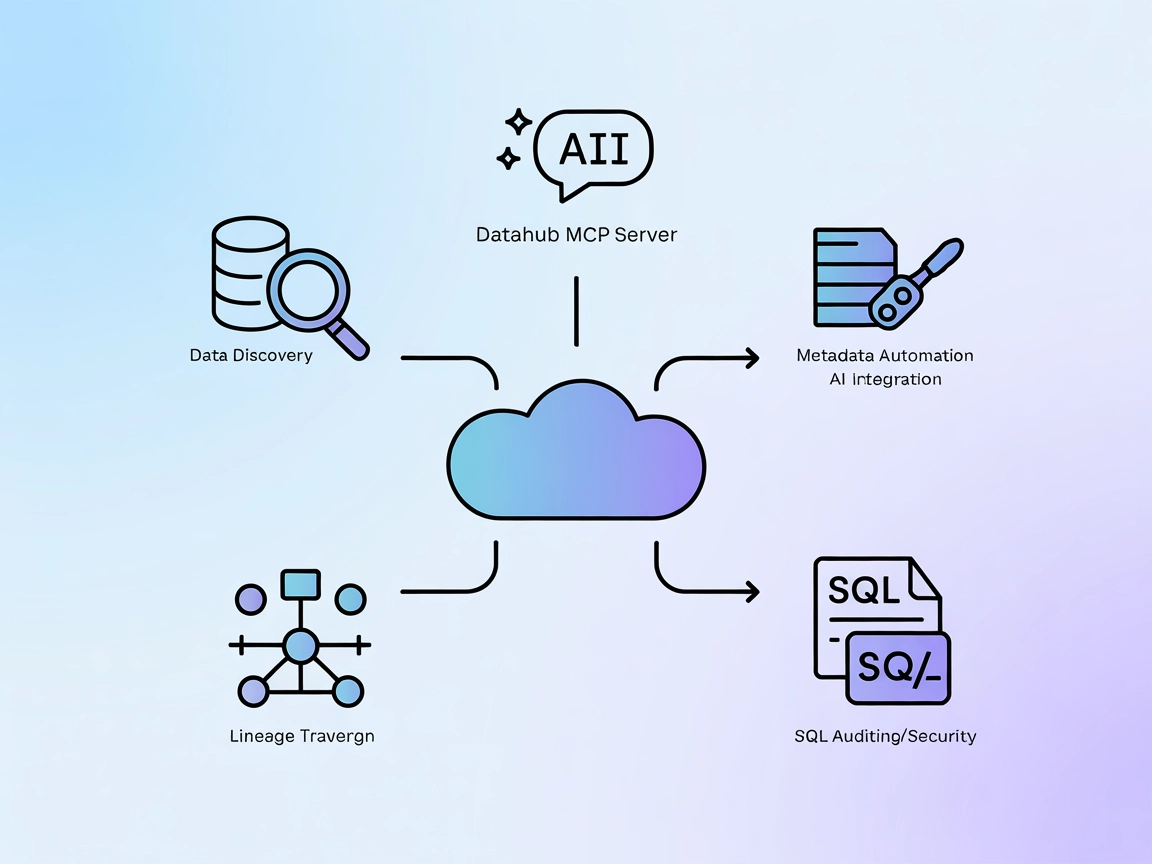
Model Context Protocol (MCP) Server
The Model Context Protocol (MCP) Server bridges AI assistants with external data sources, APIs, and services, enabling streamlined integration of complex workfl...

Integrate FlowHunt AI agents with your organization’s DataHub using the MCP Server, unlocking powerful metadata search, lineage exploration, and automated SQL auditing directly within your AI workflows.
FlowHunt provides an additional security layer between your internal systems and AI tools, giving you granular control over which tools are accessible from your MCP servers. MCP servers hosted in our infrastructure can be seamlessly integrated with FlowHunt's chatbot as well as popular AI platforms like ChatGPT, Claude, and various AI editors.
The DataHub MCP (Model Context Protocol) Server acts as a bridge between AI assistants and your DataHub data ecosystem. By exposing DataHub’s powerful metadata and context APIs via the MCP standard, this server enables AI agents to search across all entity types, fetch detailed metadata, traverse data lineage, and list associated SQL queries. This dramatically improves development workflows by allowing AI models to access up-to-date data context, perform complex queries, and automate metadata exploration directly from your preferred AI interface. DataHub MCP Server supports both DataHub Core and DataHub Cloud, making it a versatile solution for organizations seeking to integrate their metadata platform with AI-driven tools and assistants.
No prompt templates are detailed or mentioned in the repository or README.
No explicit MCP resource primitives are described in the repository or README.
No Windsurf-specific instructions found in the repository.
Install uv
.
Locate the full path to the uvx command using which uvx.
Obtain your DataHub URL and personal access token.
Edit your claude_desktop_config.json file:
{
"mcpServers": {
"datahub": {
"command": "<full-path-to-uvx>", // e.g. /Users/hsheth/.local/bin/uvx
"args": ["mcp-server-datahub"],
"env": {
"DATAHUB_GMS_URL": "<your-datahub-url>",
"DATAHUB_GMS_TOKEN": "<your-datahub-token>"
}
}
}
}
Save and (re)start Claude Desktop. Verify connection in the agent interface.
Install uv
.
Obtain your DataHub URL and personal access token.
Edit .cursor/mcp.json:
{
"mcpServers": {
"datahub": {
"command": "uvx",
"args": ["mcp-server-datahub"],
"env": {
"DATAHUB_GMS_URL": "<your-datahub-url>",
"DATAHUB_GMS_TOKEN": "<your-datahub-token>"
}
}
}
}
Save the file and restart Cursor. Check the MCP status panel.
No Cline-specific instructions found in the repository.
Install uv
.
Prepare your DataHub URL and personal access token.
Use this configuration:
command: uvx
args:
- mcp-server-datahub
env:
DATAHUB_GMS_URL: <your-datahub-url>
DATAHUB_GMS_TOKEN: <your-datahub-token>
Integrate this command in your MCP client configuration.
Always store sensitive credentials like DATAHUB_GMS_TOKEN in environment variables, not in plaintext files. In your configuration, use the env field as shown above to inject secrets securely.
Using MCP in FlowHunt
To integrate MCP servers into your FlowHunt workflow, start by adding the MCP component to your flow and connecting it to your AI agent:

Click on the MCP component to open the configuration panel. In the system MCP configuration section, insert your MCP server details using this JSON format:
{
"datahub": {
"transport": "streamable_http",
"url": "https://yourmcpserver.example/pathtothemcp/url"
}
}
Once configured, the AI agent is now able to use this MCP as a tool with access to all its functions and capabilities. Remember to change “datahub” to whatever the actual name of your MCP server is and replace the URL with your own MCP server URL.
| Section | Availability | Details/Notes |
|---|---|---|
| Overview | ✅ | Present in README and repo description |
| List of Prompts | ⛔ | No prompt templates found |
| List of Resources | ⛔ | No explicit MCP resource primitives described |
| List of Tools | ✅ | Tools described in README features section |
| Securing API Keys | ✅ | Environment variables in setup instructions |
| Sampling Support (less important in evaluation) | ⛔ | No mention of sampling in README or code |
I would rate this MCP server at about 6/10. It has a clear open-source license, multiple real tools, and basic secure setup instructions, but lacks documented prompt templates, explicit resource primitives, and advanced MCP features like sampling or roots.
| Has a LICENSE | ✅ (Apache-2.0) |
|---|---|
| Has at least one tool | ✅ |
| Number of Forks | 13 |
| Number of Stars | 37 |
It exposes DataHub's metadata and context APIs via the MCP standard, enabling AI agents to search, retrieve metadata, traverse lineage, and list SQL queries on your organizational data, directly from FlowHunt or other AI tools.
Both DataHub Core and DataHub Cloud are supported, so you can connect regardless of your deployment.
Common use cases include comprehensive data discovery, automated metadata fetching, lineage analysis for impact assessment, SQL query auditing, and integration with AI-powered agents for workflow automation.
Always use environment variables for sensitive credentials like DATAHUB_GMS_TOKEN. Inject them using the 'env' field in your configuration files to keep secrets safe.
No explicit prompt templates or MCP resource primitives are included with this server.
It provides searching across all entity types, fetching metadata, lineage traversal, and listing SQL queries associated with datasets.
Add an MCP component in your FlowHunt flow, configure it with your DataHub MCP server JSON as shown in the documentation, and connect it to your AI agent for immediate access to DataHub capabilities.
Empower your AI workflows with real-time access to organizational metadata, lineage, and data discovery tools using the DataHub MCP Server. Automate data management and governance directly from FlowHunt.

The Model Context Protocol (MCP) Server bridges AI assistants with external data sources, APIs, and services, enabling streamlined integration of complex workfl...

The ModelContextProtocol (MCP) Server acts as a bridge between AI agents and external data sources, APIs, and services, enabling FlowHunt users to build context...

Azure MCP Hub is a central resource for discovering, building, and integrating Model Context Protocol (MCP) servers on Azure. It provides guidance, SDKs, and li...
Cookie Consent
We use cookies to enhance your browsing experience and analyze our traffic. See our privacy policy.